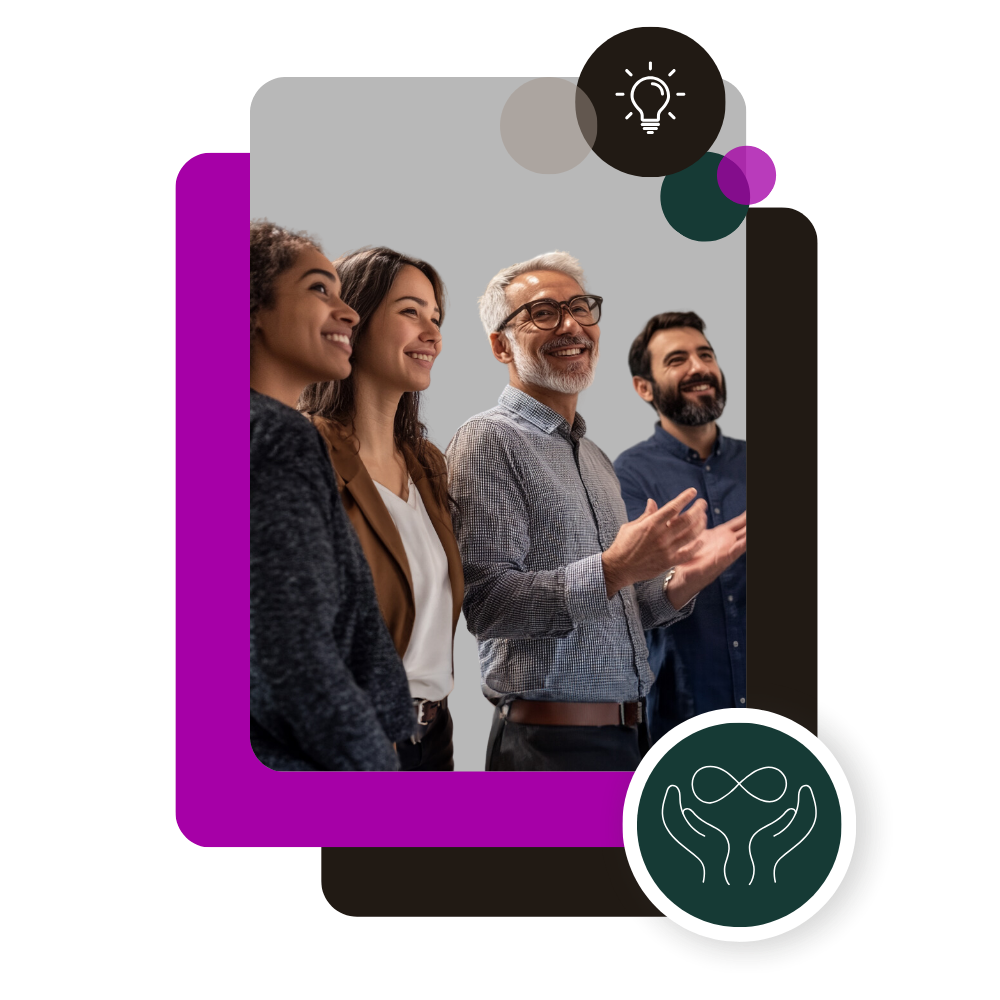accelerate performance on multi-generational teams
Turn generational differences into strengths through the power of emotional intelligence
.png)

Turn Friction into Fuel for Success on Multi-Generational Teams
Friction is natural on multi-generational teams. But it can also get in the way of performance. With widely distinct views on work styles, communication preferences, and expectations, it's hard for leaders to create work norms that work for everyone - and still deliver on team performance.
The key is not just to develop the leader, but to boost emotional intelligence (EI) across the entire team. EI enables leaders and their teams to cultivate deeper listening, manage emotions, and create environments where diverse perspectives lead to stronger collaboration and team outcomes.
the benefits of enhancing emotional intelligence on multi-generational teams
Through this training, your organization will:
develop personal openness
increase team productivity
enhance psychological safety
reduce distracting conflict
Address conflict for productive outcomes rather than letting it be a distraction for the team.
HOLD for Quote from Pepsi
—Person at Pepsi, Title
Leaders and teams create a culture together for all generations to thrive
Creating a culture where employees of all generations can thrive requires the commitment of the leader and every team member. While leaders play a crucial role in setting cultural expectations and resolving conflicts, success depends on how every team member listens and responds to one another.
We offer programs that address the challenges of multi-generational teams from the perspective of the leader and team members. While using both programs will maximize impact on your culture, you can also use either program as a stand-alone to address challenges quickly.
Leading Multi-generational Teams
Leadership Program
Give leaders EI-based techniques to manage team differences, increase collaboration, address conflict, and ensure high levels of psychological safety on a multi-generational team.
Collaborating Across Generations
Individual Contributor Program
Increase empathy among team members across generations, turning different viewpoints into strengths for enhanced collaboration, productive conflict, and unified team commitment.Leadership Program
Leading Multi-generational Teams
This program equips frontline and mid-level leaders with the skills to navigate generational differences, foster psychological safety, and build high-performing teams. Grounded in neuroscience and emotional intelligence, the program helps leaders understand generational perspectives, enhance communication, and create positive team cultures.
Through interactive learning and real-world application, participants develop strategies to manage generational conflict, strengthen collaboration, and lead with empathy. The program provides practical tools to foster engagement across all generations, ensuring leaders can create work environments where every team member feels valued and empowered.

leadership program logistics
We recommend a 6-week blended learning journey for this program to maximize learner engagement and skill application. For organizations that want to integrate Leading Multi-generational Teams content within a larger program in their organization, we recommend using the microcourses and live learning session content only.
audience
frontline and midlevel leaders
participants
up to 24 per cohort
format
blended self-paced and live (in person or virtual) learning
duration
6-week learning journey, with four hours of live learning
Self-Insight Tool
A short survey to help leaders understand their multigenerational leadership baseline by reflecting on current awareness of generational difference, psychological safety, and team dynamics. Participants receive personalized insights to help them identify key growth areas, and personalized recommendations for areas to prioritize during the program.
Self-paced Learning
Explore the distinct characteristics, values, and communication styles of different generations, and the impact of technology on generational perspectives.
Live Sessions
Engage in a Pathfinder Pursuit game to illustrate team dynamics. Engage in research insights to understand the importance of equal participation and emotional awareness.
Personalized Application Challenges
Each leader can choose from a personalized list of real-world leadership application challenges to apply what they’ve learned. Each challenge takes about 30 minutes to complete.
Personal Growth Insights
Engage in a short post-program inventory to measure skill growth in multigenerational leadership skills, focusing on psychological safety. Receive tailored insights for ongoing development and strategies to sustain leadership growth.
Individual Contributor Program
Collaborating Across Generations
This course helps individual contributors enhance communication, collaboration, and conflict resolution in multi-generational teams. By integrating neuroscience, emotional intelligence, and practical team-building techniques, the program equips participants with the skills to navigate generational dynamics, foster psychological safety, and build stronger workplace relationships.
With a focus on real-world application, participants engage in exercises that address common workplace challenges, such as resolving generational conflicts, increasing trust, and ensuring all voices are valued. The program provides practical tools for navigating workplace norms, reducing power dynamics, and fostering open dialogue across generations.
.png)
individual contributor program logistics
We recommend a 6-week blended learning journey for this program to maximize learner engagement and skill application. For organizations that want to integrate Collaborating Across Generations content within a larger program in their organization, we recommend using the microcourses and live learning session content only.
audience
individual contributors
participants
up to 24 per cohort
format
blended self-paced and live (in person or virtual) learning
duration
6-week learning journey, with three hours of live learning
Self-Insight Tool
Self-paced Learning
Live Sessions
Personalized Application Challenges
Each participant can choose from a personalized list of application challenges to apply what they’ve learned to daily work situations to reinforce collaboration and trust. Each challenge takes about 30 minutes to complete.
Personal Growth Insights
Participants engage in a short post-program survey to reflect on their personal growth in empathy, trust-building, and conflict resolution skills, especially as they relate to working with colleagues across generations. Participants receive tailored insights for ongoing development.
